THIS BLOG IS NOW CLOSED. THANK YOU FOR FOLLOWING OUR LIVE COVERAGE.
READ MORE ON SPAIN’S ELECTIONS HERE.
Spaniards headed to the polls on Sunday in what many feel is a pivotal general election for the direction of the country. Incumbent Socialist (PSOE) Prime Minister Pedro Sánchez is battling for another term in office, while polls suggested the Spanish right, led by the Partido Popular’s (PP) Alberto Núñez Feijóo were on course for victory.
READ ALSO: A one-minute guide to Spain’s national election
However, despite what the polls predicted, Sunday’s election resulted in a hung parliament.
Follow The Local’s live blog for all the latest developments on election day:
15.46 Pedro Sánchez told his supporters today that he is not considering the possibility of a repeat election by the end of the year, arguing that “democracy will find the way”. In the meantime, Feijóo is calling on all of Spain’s parties to let the PP govern alone with 136 seats, 40 fewer than those needed for an absolute majority. Last night, PP supporters in Madrid chanted the name of their region’s president Isabel Díaz Ayuso rather than Feijóo’s, an awkward moment which suggests that if there are elections held again in a few months, the PP may reconsider their candidate.
14.24: If you’re a foreigner living in Spain it may seem a little strange that the centre-right Popular Party won the most votes and seats in the general election but is unlikely to be able to form a government. This newly published article in The Local Spain explains why.
13.25 “Spain’s electoral system hasn’t punished the PP, quite the opposite,” argues one of the political commentators on RTVE, Spain’s public broadcaster. “With 33 percent of votes, the Popular Party obtained 39 percent of seats, 20 percent more seats than if Spain had a pure proportional representation system. That same system only favours the Socialists by 3 percent and the real losers are Vox and Sumar”. You can find out more about Spain’s electoral system and why some people want it changed in this article.
12.31 “Both the right and the left have a very tenuous, and hazardous, path to a majority, and neither is very likely to succeed,” says Federico Santi, analyst at political risk consultancy Eurasia Group. The front pages of newspapers on Monday highlighted the political gridlock now facing Spain. “The government is up in the air,” top-selling daily newspaper El País headlines on its front page. Here are some other front covers of Spain’s main dailies.
Las portadas de los periódicos 🗞️ de este lunes
👉 https://t.co/Ukj0EL7Og4 pic.twitter.com/K8RN1MTjyG
— Elimparcial.es (@elimparciales) July 24, 2023
10.55 “We won’t make Sánchez Prime Minister for nothing in return,” tweeted exiled former Catalan president Carles Puigdemont, whose separatist party Junts per Catalunya (Together for Catalonia) may be pivotal in giving Spain’s Socialists an absolute majority of 176.
09.49 – PP’s campaign spokesman, Borja Sémper, has told the Spanish press this morning that party leader Alberto Núñez Feijóo will begin coalition talks as the “winner of the elections” to try and form “a government alternative” that does not depend on the regional parties a PSOE and Sumar coalition would likely need to reach a majority.
09.10 – The following map of Spanish municipalities by RTVE shows support for the Popular Party in blue (136 seats) and for the Socialists in red (122 seats). It’s a bittersweet win for the PP as having the most votes and seats doesn’t mean they will necessarily get to govern due to Spain’s parliamentary system.
#Especial23JRTVE | Consulta los resultados por municipio en estas elecciones generales en nuestro mapa interactivo.https://t.co/HYhvFZEtGx pic.twitter.com/TALx9rAWBy
— RTVE (@rtve) July 23, 2023
08.26 Buenos días. July 23rd was an exhilarating day and night of politics in Spain with plenty of surprises and still many conclusions left to be drawn. The right-wing PP-Vox block does not have a majority which which govern, but neither does the left-wing PSOE and Sumar partnership.
00.30 Talking to a crowd of supporters outside the PP headquarters on Madrid’s Calle Génova, Feijóo stressed that “as the candidate of the party that won the most seats, I believe it is my duty to try to form a government,” adding that no other Spanish Prime Minister who received the most votes in a general election has not ended up governing. Sánchez on the other hand told his voters that “the regressive block made up of the Popular Party and Vox were beaten”.
00.15 Almost 100 percent of the ballots have been counted and so far the biggest losers of the ‘big four’ are far-right party Vox, whose leader Santiago Abascal is the only candidate to admit defeat after his party ended up with 19 fewer seats that in the 2019 election. The PP, on the other hand, have gained 47 seats and the trust of 3 million more Spaniards. A third of Spaniards (33 percent) have voted for Feijóo. Is a PP-Vox partnership no longer on the cards?
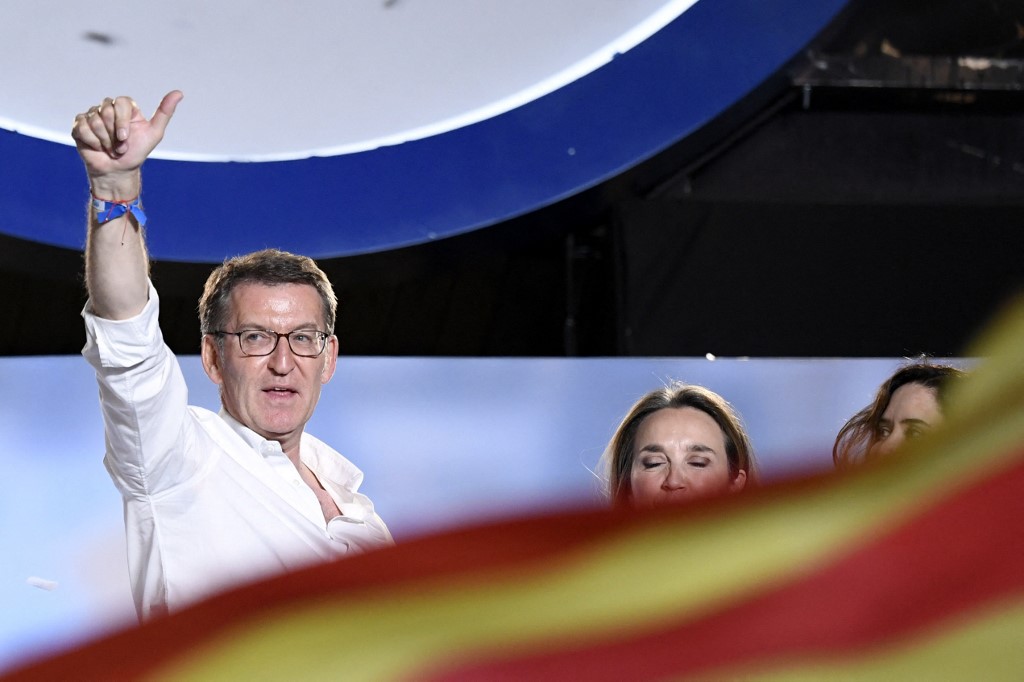
23.31 Almost all the preliminary polls suggested that the PP would clearly win the elections, however, it’s proving to be a far more tightly fought race to La Moncloa. Spain’s Conservatives (136) do have more seats than the Socialists (122) but far fewer smaller partners than PSOE, which may mean that Vox’s 33 seats won’t be enough to govern. In order to stay in power, Pedro Sánchez may have to concede in some way to parties such as EH Bildu and Esquerra Republicana, but first let’s wait for all the votes to be counted (we’re at 98 percent).
22.45 The tables appear to be turning; with 85 percent of votes counted a PSOE-led coalition with hard-left party Sumar as well as regional parties Partido Nacional Vasco, Esquerra Republicana and EH Bildu could be just about enough to secure a majority. But it’s looking tight once again, and don’t forget that Spain had four general elections between 2015 and 2019.
22.15 With 70 percent of votes counted, Spain’s Popular Party has the most seats with 131, followed by the PSOE with 128, Vox has 33 and Sumar has 30. A PP-Vox coalition would currently not have the 176 seats needed for an absolute majority with which to govern, even with the potential support of smaller conservative regional parties such as Union del Pueblo Navarro. No hay nada decidido (Nothing has been decided yet).
21.33 “Spanish citizens like chaos, in the sense of not giving a sufficient majority to one of the parties that could realistically govern,” political commentator and El Mundo journalist Lucía Méndez told Spanish broadcaster RTVE. “That’s been the case since 2015 in all the elections, we’re living through constant instability”.
21.08 Ballot results have not yet been published for the Canary Islands and Melilla, but the latest data from Sigma Dos indicates that Spain’s PSOE has 127 escaños (seats), the PP has 122, far-right Vox 31 and far-left Sumar 27. Vox could be key to the final result and who governs, as could regional parties in Catalonia and the Basque Country.
20.33 According to data from Spanish think tank Sigma Dos, the right-wing Partido Popular is so far the party with the most votes (34.2 percent and between 145 and 150 seats, 5.3 points ahead of the Socialists). Whether the PP will secure an absolute majority to govern without Vox is yet to be decided.
18.25 – Following on from the turnout figures, Spain’s state TV broadcaster RTVE reports that the regional breakdown looks like this (as of 6pm):
Andalucía – 53.17 percent
Aragón – 52.48 percent
Canary Islands – 45.35 percent
Cantabria – 60.31 percent
Castilla y León – 54.57 percent
Castilla-La Mancha – 56.02 percent
Catalonia – 48.66 percent
Ceuta – 39.30 percent
Melilla – 31.84 percent
Madrid – 53.65 percent
Navarra – 51.66 percent
Valencian Community – 57.88 percent
Extremadura – 55.69 percent
Galicia – 55.91 percent
Balearic Islands – 48.55 percent
La Rioja – 56.93 percent
Basque Country – 52.37 percent
Asturias – 54.06 percent
Murcia – 54.99 percent
18.15 – Despite early signs that the summer election might not affect voter turnout, it seems the combination of the heat and holiday season may have. Provisional figures released show that as of 6pm turnout was 52.01 percent, 4.84 percent lower than the same time during the last election, in November 2019, when it was 56.85 percent.
17.58 – Election day will be extended by one hour (to 9pm) in the Basque town of Beasain, in northern Spain, after several polling stations ran out of ballots for one specific party, though it has not been confirmed which.
17.40 – What happens to the votes once the polls close at 8pm? First the postal votes will be added and then the count begins. First votes to the Congress of Deputies are counted, then to the Senate, Spain’s upper chamber.
17.00 – With three hours to go until the polls close, here’s what the likely governing party PP (according to the polls) have pledged to do in office.
16.35 – Spain’s DGT, the traffic directorate, has reported heavy traffic around Madrid and Seville in both directions as voters try and cast their votes before the polls close. As of 4pm, the DGT has implemented special measures outside Madrid, including opening up extra lanes of traffic, in order to free up the congestion.
16.10 – If the polls are right and the Partido Popular wins the most votes but falls short of an absolute majority, it will very likely look to far-right party Vox in order to govern.
But what does that mean for immigrants? Here’s what a Vox government could mean for foreigners in Spain.
15.38 – Spanish outlet 20minutos is reporting that the regions experiencing the highest increase in turnout (as of 2pm) are: Extremadura (+7.99 percent), Galicia (+7.05 percent), Castilla-La Mancha (+6.62 percent), Baleares (+6.32 percent), Andalusia (+6.25 percent), La Rioja (+5.33 percent) and Murcia (+5.23 percent).
Turnout has risen more moderately in Asturias (+4.62 percent), Cantabria (+3.87 percent), the Valencian community (+3.73 percent), Navarra (+1.89 percent), Canary Islands (+1.82 percent), Aragón (+0.9 percent) and Ceuta (+0.17 percent).
So far, voter turnout has fallen in Catalonia (-3.79 percent), the Basque Country (-2.98 percent), Melilla (-1.32 percent) and Madrid (-0.16 percent).
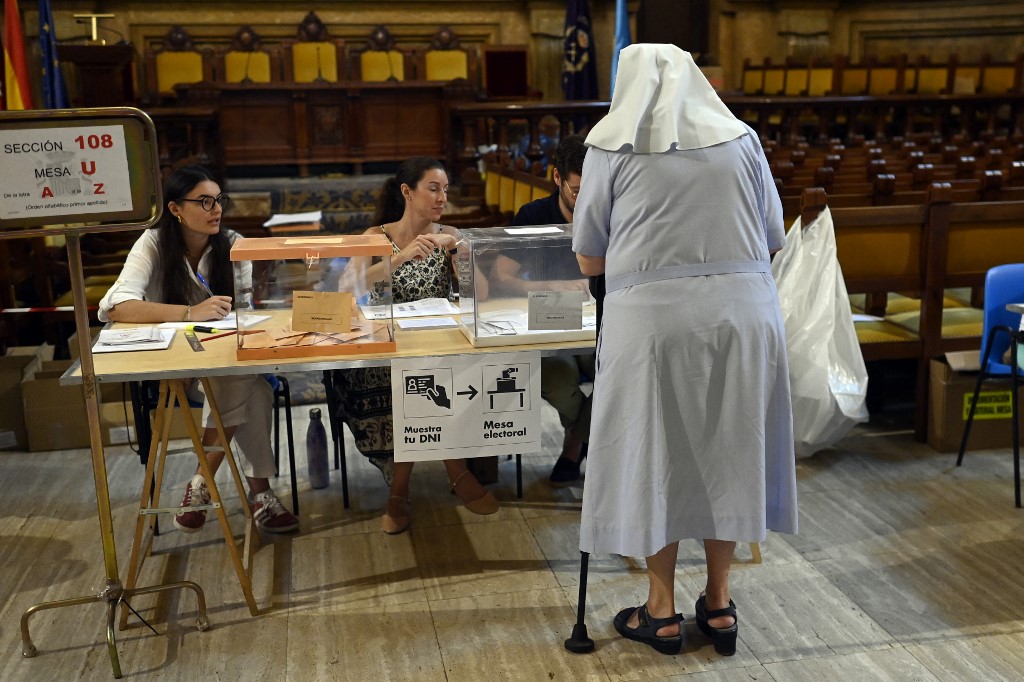
15.01 – Provisional turnout data has also been released at the regional level. The regions with the highest turnout so far (as of 2pm) are: the Valencian Community (46.24 percent), La Rioja (45.75 percent), Extremadura (45.16 percent), Castile-La Mancha (44.69 percent) and Murcia (44.24 percent).
The regions with the lowest turnout so far are Melilla (23.29 percent), Ceuta (27.44 percent), the Canary Islands (28.90 percent), Catalonia (36.79 percent), the Basque Country (37.20 percent) and the Balearic Islands (37.27 percent).
14.25 – In person voter turnout is also breaking records. According to provisional data from Spain’s Data Dissemination Centre, as of 2pm turnout stands at 40.45 percent – 2.5 percent more than in the November 2019 elections, when it was 37.92 percent.
13:54 – Newly released figures show that the number of postal votes cast in these July 2023 elections has been the highest since 2008, when records began.
13.00 – After voting this morning Partido Popular leader Alberto Núñez Feijóo has told the Spanish press that the “model of country is at stake” and that “Spain can start a new era.” He also reinforced his desire for “a solid and strong government”.
12.35 – A train breakdown has suspended routes between Madrid and Valencia in the middle of election day. State owned travel company Adif has said it working to solve the problem “as soon as possible” and has proposed alternative routes for affected travellers.
11.50 – Both the likely next Prime Minister, PP leader Alberto Núñez Feijóo, and leader of far-left platform Sumar, Yolanda Díaz, have voted in Madrid this morning.
11.23 – Vox’s candidate, Santiago Abascal, has voted at the Colegio Cristo Rey in Madrid. Polls suggest that the far-right leader could prove to be kingmaker in forming any kind of governing coalition with centre-right Partido Popular.
Here’s ten things you need to know about Vox.

11.03 – Voting seems to running smoothly so far, with no hiccups at the polling stations. “There has been no problems,” Secretary of State for Communication, Francesc Vallès, told the Spanish press this morning.
10.50 – The region with the most voters is Andalusia, with 6.66 million, followed by Catalonia (5.7 million) and Madrid (5.24 million). After that it is the Valencian Community (3.73 million), Galicia (2.66 million) and Castilla y León (2.08 million).
10.23 – The campaign has been full of personal attacks and culture war rhetoric. If you’re wondering about the policies of each party, you can read up on the main policy areas (and divisions) here.
10:01 – Polls open in the Canary Islands, where more than 1.7 million people will cast their votes.
09.25 – One Spanish town has already completed its vote. The tiny town of Villarroya in La Rioja has once again become the fastest town in Spain to vote, with its seven registered voters voting in just 26 seconds – 3 seconds less than their record at the recent municipal and regional elections on May 28th.
09.05 – Prime Minister Pedro Sánchez is the first candidate to cast his ballot, voting at the Colegio de Nuestra Señora del Buen Consejo in Madrid just minutes after the doors opened.
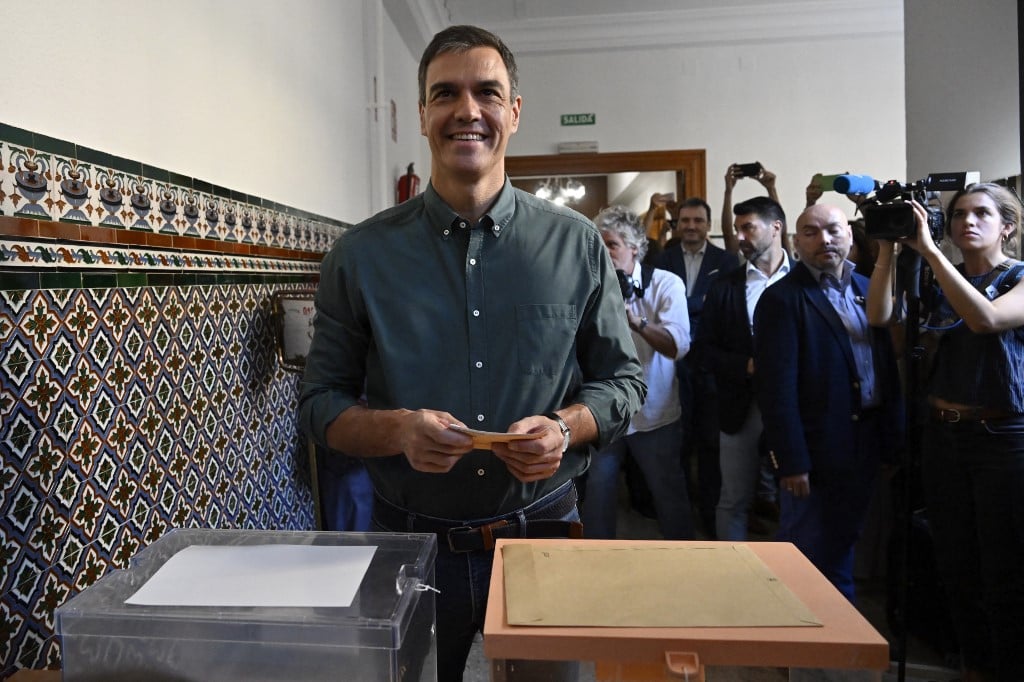
09:00 – Spain’s polling stations have now all opened, most of which are equipped with fans and bottles of water to help voters keep cool on a day where temperatures are expected to hit 40C in some parts of the country. Polls will close at 8:00pm with the final results expected several hours later.

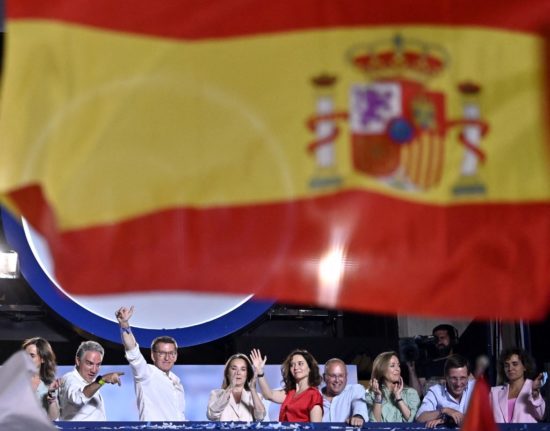
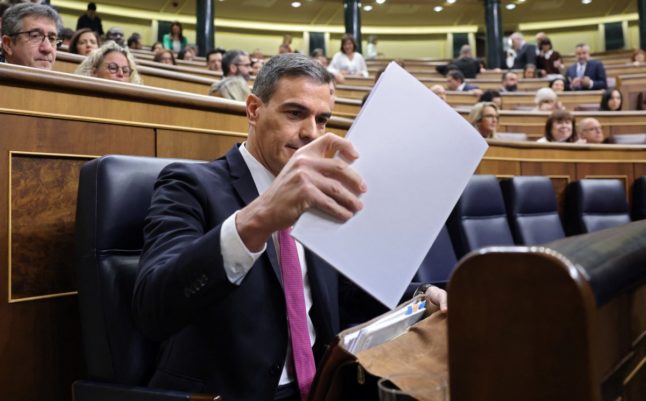
 Please whitelist us to continue reading.
Please whitelist us to continue reading.
Member comments